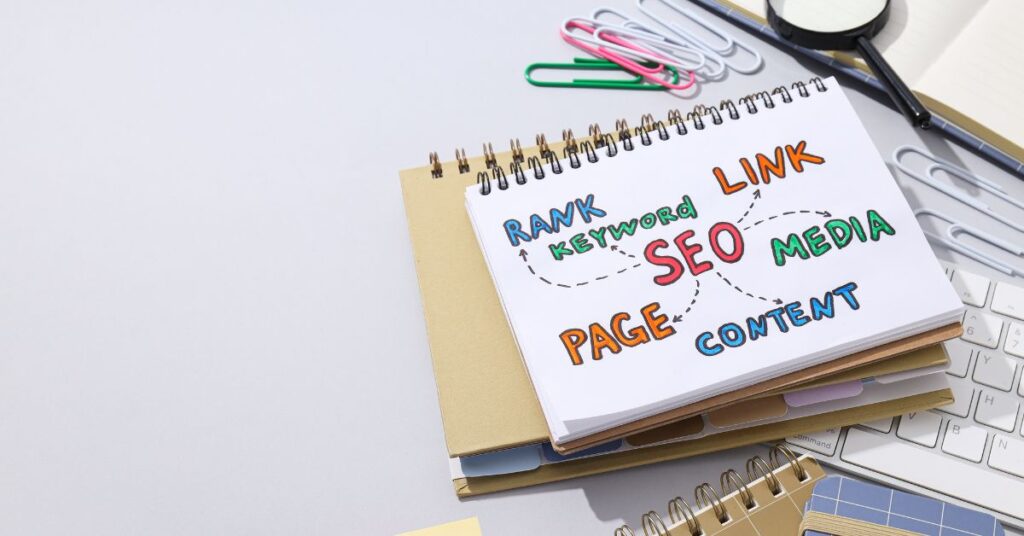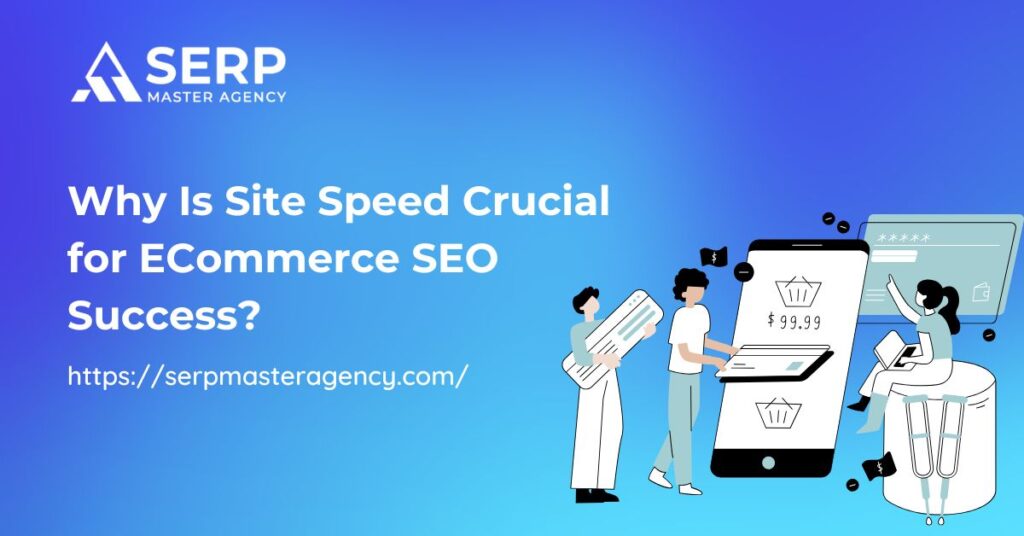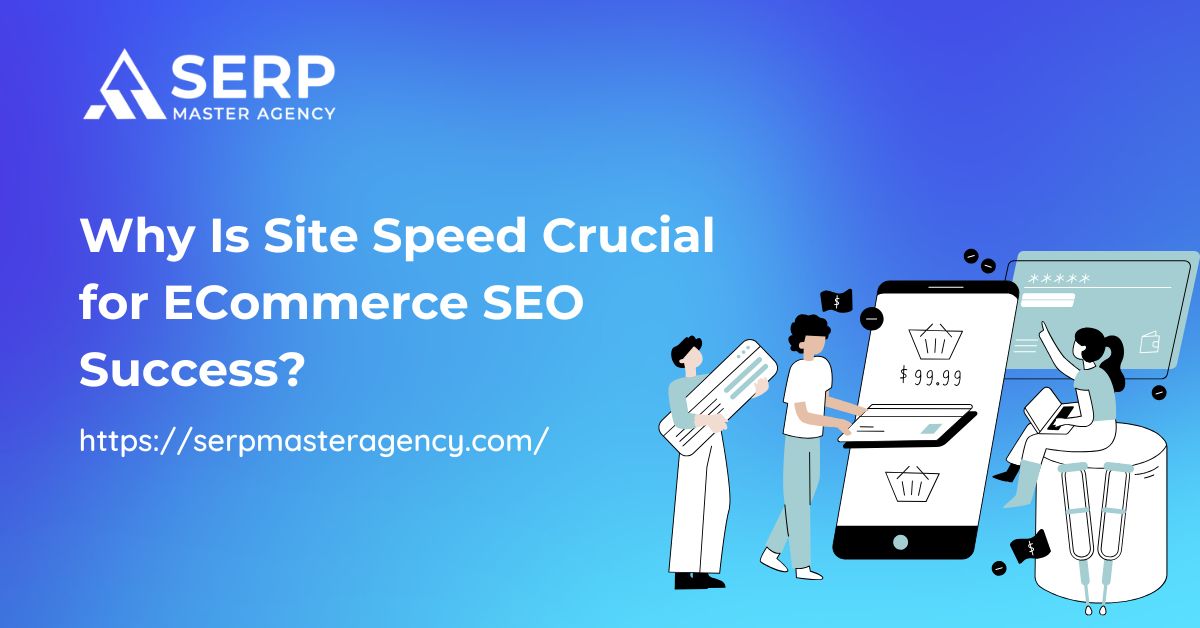Have you ever clicked away from a website because it loaded too slowly? You’re not alone. Most people expect pages to load instantly.
If a site takes more than a few seconds, many users give up and move on. This is especially true for online stores.
For ECommerce websites, site speed is more than just a nice-to-have feature—it’s a key factor for success.
A fast website keeps people interested, helps them browse products smoothly, and encourages them to make a purchase.
But there’s another big reason site speed matters: it affects how your store appears on Google. Search engines like fast sites.
So, if your ECommerce site is slow, you’re likely losing both customers and visibility.
Let’s explore why site speed plays such a big role in your online store’s growth and SEO performance.
What Is Site Speed and Why Does It Matter?
Simple Explanation of Site Speed
Site speed is the time it takes for a webpage to fully load. This includes images, buttons, text, and anything else on the screen.
For example, when someone clicks on your product page, how long does it take for the product image, price, and “Add to Cart” button to appear? That’s your site speed.
Most shoppers today expect websites to load in under three seconds. If it takes longer, they may lose patience.
This is especially true for first-time visitors who don’t yet trust your store. At SERP Master Agency, we often see that even small speed improvements can make a big difference in keeping new visitors engaged and ready to shop.
Impact on User Experience
A slow-loading website is frustrating. It breaks the shopping flow. Imagine trying to buy shoes and having to wait five seconds every time you click something.
That delay makes users feel annoyed or even anxious, especially if they’re browsing on a mobile device with a slower connection.
When shoppers leave your site quickly because of slow speed, it increases what’s called the “bounce rate.”
A high bounce rate is bad for SEO. Google sees this as a sign that people didn’t find your site useful, which can cause your rankings to drop.
Fewer visitors will find you in search results, and your store could fall behind faster competitors.
How Google Measures and Ranks Site Speed
Core Web Vitals
Google uses specific tools to measure how well your website performs. The most important ones are called Core Web Vitals. These include:
- Largest Contentful Paint (LCP): This checks how long it takes for the biggest content on the page (like a hero image or headline) to show up.
- First Input Delay (FID): This measures how long it takes for your site to respond after someone clicks or taps.
- Cumulative Layout Shift (CLS): This looks at how much the layout moves around as the page loads.
Let’s say a user tries to click “Buy Now,” but the button suddenly shifts because the page is still loading.
That’s a bad experience, and it can lead to missed sales. Google wants websites to avoid that kind of frustration, which is why Core Web Vitals are so important.
Speed as a Ranking Factor
Google wants to give users the best search experience. That’s why it ranks faster websites higher in the search results.
ECommerce site loads quickly, Google sees it as more useful and pushes it higher up.
This matters because users rarely scroll past the first page of search results. If your site isn’t fast enough, you could end up buried under dozens of other stores—even if your products are great.
Effects of Slow Speed on Online Shopping Behaviour
Lost Sales and Lower Conversions
Speed has a direct impact on sales. Studies show that even a one-second delay in load time can lead to a 7% drop in conversions.
That means for every 100 people trying to shop, seven may leave just because your site was too slow.
If you run an ad campaign to bring in visitors, but your site loads slowly, you’re wasting money. People click the ad, wait, get frustrated, and leave without buying anything. That’s lost revenue.

Mobile Users Are More Sensitive
More than half of all online shopping is done on phones. Mobile users expect even faster load times, especially when they’re on the go.
Google now uses mobile-first indexing, which means it looks at your mobile site before your desktop version when deciding where to rank you in search.
If your mobile version is slow, clunky, or hard to use, it can hurt both your sales and your search rankings. Speed isn’t just helpful—it’s necessary.
Technical Reasons Behind Slow ECommerce Websites
Common Causes of Slowness
Many online stores become slow over time due to common issues. Large, uncompressed images are a big reason.
They take longer to load, especially on mobile devices. Too many scripts or plugins—like tracking tools, chat widgets, or pop-ups—can also drag your site down.
Other causes include unoptimised code, outdated themes, or overloaded servers. Even small problems can add up, causing long delays and lost sales.
Tools to Measure and Improve Speed
You don’t need to guess if your site is slow. There are free tools that show exactly what’s wrong:
- Google PageSpeed Insights provides a speed score and gives suggestions.
- GTmetrix shows which files are taking the longest to load.
- Lighthouse (built into the Chrome browser) gives a detailed breakdown of your site’s performance.
Using these tools, store owners can find and fix problems quickly, even without being a tech expert.
How Faster Sites Help SEO and Rankings
Lower Bounce Rate, More Time on Page
When your site loads fast, people are more likely to stay and look around. They might view multiple products, read reviews, or explore different categories.
This tells Google that your site is useful, which helps improve your search rankings.
More time on your website also gives you more chances to sell. A fast-loading page keeps users interested and engaged.
Higher Rankings = More Traffic
A faster website gives you a better chance of showing up higher in search results. More visibility brings in more visitors, and more visitors mean more sales opportunities.
Working with an experienced SEO Company can help you turn speed improvements into higher rankings and stronger long-term growth.
What Can ECommerce Owners Do to Improve Speed?
Compress Images and Use Lazy Loading
Large image files are one of the biggest reasons websites load slowly. By compressing images, you reduce their size without losing quality.
Lazy loading means images only load when someone scrolls down to see them. This makes your pages load faster upfront.
Imagine clicking on a category page and only the images you’re looking at load first. That’s much quicker and saves time for the user.
Use Reliable Hosting and CDN
Your hosting service plays a major role in speed. A slow server means a slow site—no matter how well your site is designed.
Using a Content Delivery Network (CDN) helps by storing your site’s files on multiple servers around the world. That way, customers in different countries can access your site faster.
Better hosting and a good CDN can make a big difference in how fast your site performs globally.
Clean Up Your Code
Over time, many websites collect extra plugins, old scripts, and heavy themes. These extras slow things down.
You can speed up your site by removing anything you don’t need and keeping your code clean.
Ask your developer or a speed optimisation expert to check for unused files, fix bloated scripts, and make sure everything loads in the right order.
Conclusion
A fast-loading website is one of the most important parts of a successful ECommerce strategy. It helps people stay longer, shop more, and trust your store. It also tells Google that your site is worth ranking higher.
Even a small delay in page speed can mean fewer visitors and lost sales. That’s why every online store—big or small—should focus on improving speed.
At SERP Master Agency, we understand how important speed is to your SEO goals and overall success. Paying attention to site speed isn’t just smart—it’s essential for growing your online business.
If you’re serious about boosting traffic and improving user experience, now’s the time to prioritise performance. A faster site is a better site—for both customers and search engines.
And if you’re unsure where to start, working with a trusted SEO Company can help uncover issues and turn your website into a smooth, speedy shopping experience.

Suraj Rana is a highly regarded SEO expert specializing in the dental industry. His expertise lies in crafting strategic SEO marketing plans to help new or expanding businesses increase their online visibility and attract more customers. Suraj Rana’s skills extend to improving website rankings and boosting organic search visibility, thereby enhancing web traffic and return on investment for businesses.



